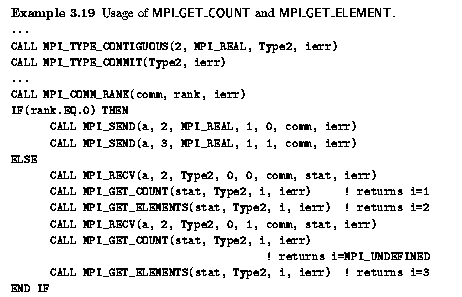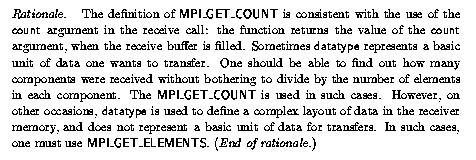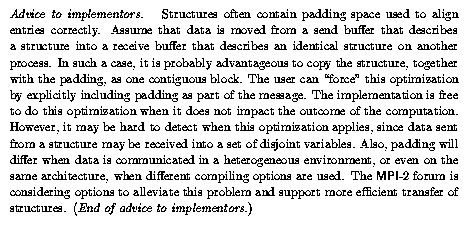If a message was received using a user-defined datatype, then a
subsequent call
to MPI_GET_COUNT(status, datatype, count)
(Section ![]() ) will
return the number of ``copies'' of
datatype received (count).
That is, if the receive operation was MPI_RECV(buff,
count,datatype,...) then MPI_GET_COUNT
may return any integer value k , where 0 <= k <= count .
If MPI_GET_COUNT returns k , then the number of primitive
elements received
is n*k , where n is the number of primitive elements in the type
map of datatype.
The received message need not fill an integral number of ``copies'' of
datatype.
If the number of primitive elements received is not a
multiple of n , that is, if the receive operation has not received an
integral number of datatype ``copies,'' then
MPI_GET_COUNT returns the value MPI_UNDEFINED.
MPI_UNDEFINED
) will
return the number of ``copies'' of
datatype received (count).
That is, if the receive operation was MPI_RECV(buff,
count,datatype,...) then MPI_GET_COUNT
may return any integer value k , where 0 <= k <= count .
If MPI_GET_COUNT returns k , then the number of primitive
elements received
is n*k , where n is the number of primitive elements in the type
map of datatype.
The received message need not fill an integral number of ``copies'' of
datatype.
If the number of primitive elements received is not a
multiple of n , that is, if the receive operation has not received an
integral number of datatype ``copies,'' then
MPI_GET_COUNT returns the value MPI_UNDEFINED.
MPI_UNDEFINED
The function MPI_GET_ELEMENTS below can be used to determine the number of primitive elements received.
MPI_GET_ELEMENT(status, datatype, count) IN status status of receive IN datatype datatype used by receive operation OUT count number of primitive elements receivedMPI_Get_elements(MPI_Status *status, MPI_Datatype datatype, int *count)
MPI_GET_ELEMENTS(STATUS, DATATYPE, COUNT, IERROR)INTEGER STATUS(MPI_STATUS_SIZE), DATATYPE, COUNT, IERROR

The function MPI_GET_ELEMENTS can also be used after a probe to find the number of primitive datatype elements in the probed message. Note that the two functions MPI_GET_COUNT and MPI_GET_ELEMENTS return the same values when they are used with primitive datatypes.

